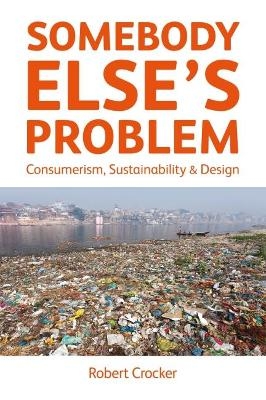
Somebody Else’s Problem
Greenleaf Publishing (Verlag)
978-1-78353-503-3 (ISBN)
Gold winner of the AXIOM Business Book Award in the category of Philanthropy, Non-Profit, Sustainability. Please see: http://www.axiomawards.com/77/award-winners/2017-winners
Consumerism promises a shortcut to a 'better' life through the accumulation of certain fashionable goods and experiences. Over recent decades, this has resulted in a rising tide of cheap, short-lived goods produced, used and discarded in increasingly rapid cycles, along the way depleting resources and degrading environmental systems.Somebody Else’s Problem calls for a radical change in how we think about our material world, and how we design, make and use the products and services we need. Rejecting the idea that individuals alone are responsible for the environmental problems we face, it challenges us to look again at the systems, norms and values we take for granted in daily life, and their cumulative role in our environmental crisis.Robert Crocker presents an overview of the main forces giving rise to modern consumerism, looks closely at today’s accelerating consumption patterns and asks why older, more ‘custodial’ patterns of consumption are in decline. Avoiding simplistic quick-fix formulas, the book explores recommendations for new ways of designing, making and using goods and services that can reduce our excess consumption, but still contribute to a good and meaningful life.
ROBERT CROCKER is Deputy Director of the China Australia Centre for Sustainable Urban Development. He teaches the history and theory of design and design for sustainability at the University of South Australia.
Foreword by Stuart Walker Introduction: The problem with consumerism Part 1: From consumption to consumerism1. Pleasure and luxury in consumptionPleasure in consumption Deception and choice in consumerismThe idea of luxuryThe democratization of luxuryHogarth’s A Rake’s ProgressSomebody and nobody 2. Imitation in design and consumptionImitation and global tradeAdaptive imitation in designConsumption and imitationFrom imitation to hyper-consumption 3. Vision and ideology in design and consumptionThe rise of the consumer citizen Design, vision and ideologyWilliam Morris’s gospel of work Shaping the ideal home through design Inside the ‘design factory’ 4. Enabling systems in consumptionSystems and their sunk-cost effectsThe freedom of the roadThe dream of flightIndividualization and substitution Learning from pedestrians Part 2: The escalation of consumption 5. Comparison, competition and consumerismThe fifties syndromeThe newcomersComparison and competition Managing product valueSpace inflation6. Technology and accelerationFounding mythsFrom augmentation to controlThe high cost of optimizationA Revolution in Time From the digital to the ‘physible’7. The consumption of natureFrom the gardens of childhoodUnderstanding ‘nature’Nature as ideaThe conquest of natureTelling stories about natureNature as perfectionNatural ZombiesPart 3: Towards sustainable consumption 8. Learning from the pastWhat is ‘sustainable consumption’?Enabling the good lifeMy father’s booksCustodian consumptionTowards the throwaway society9. Values, goals and timeCatching up with debtThe heart of the dilemmaA self-centred societyLearning to play the fluteRediscovering the land10. From post-caution to precautionThe post-cautionary principleAsking questions firstThe many uses of co-creationCo-creation through living labsLocating the precautionaryTowards sustainable consumptionConclusion
| Erscheint lt. Verlag | 25.11.2016 |
|---|---|
| Verlagsort | Saltaire |
| Sprache | englisch |
| Maße | 156 x 234 mm |
| Gewicht | 498 g |
| Themenwelt | Kunst / Musik / Theater ► Design / Innenarchitektur / Mode |
| Naturwissenschaften ► Biologie ► Ökologie / Naturschutz | |
| Sozialwissenschaften ► Soziologie | |
| Technik ► Architektur | |
| Technik ► Umwelttechnik / Biotechnologie | |
| Wirtschaft ► Betriebswirtschaft / Management ► Marketing / Vertrieb | |
| Wirtschaft ► Betriebswirtschaft / Management ► Unternehmensführung / Management | |
| Wirtschaft ► Volkswirtschaftslehre | |
| ISBN-10 | 1-78353-503-2 / 1783535032 |
| ISBN-13 | 978-1-78353-503-3 / 9781783535033 |
| Zustand | Neuware |
| Haben Sie eine Frage zum Produkt? |
aus dem Bereich


